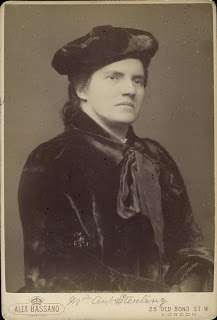Antoinette Sterling
Antoinette Sterling (January 23, 1841 – January 10, 1904) was an Anglo-American vocalist.
Antoinette Sterling Mackinlay | |
|---|---|
 | |
| Background information | |
| Birth name | Jane Antoinette Sterling.[1] |
| Also known as | Madame Antoinette Sterling |
| Born | January 23, 1841 Sterlingville, Town of Philadelphia, Jefferson County, New York, USA. |
| Died | January 10, 1904 (aged 53) Hampstead, London, England, UK |
| Occupation(s) | Vocalist |
Life
She was born at Sterlingville, New York State, on 23 January 1841.[2] Her father, James Sterling, owned large blasting furnaces, and she claimed descent from William Bradford. In childhood, she imbibed anti-British prejudices, and her patriotic sympathies were so stirred in childhood by the story of the destruction of tea cargoes in Boston harbour, that she resolved never to drink tea, and kept the resolution all her life. She already possessed a beautiful voice of great compass and volume, and took a few singing lessons at the age of eleven from Signor Abella in New York. When she was sixteen her father was ruined by the reduction in 1857 of the import duties in the protective tariff, and died; she went to the state of Mississippi as a teacher, and after a time gave singing lessons.
When the civil war broke out her position became very unpleasant, and with another northern girl she fled by night during the summer of 1862, and was guided north by friendly negroes. Afterwards she became a church singer and was engaged in Henry Ward Beecher's church at Brooklyn, where a special throne-like seat was erected for her. In 1868, she came to Europe for further training; she sang at Darlington in Handel's Messiah on 17 December, and elsewhere, taking some lessons under W. H. Cummings in London before proceeding to Germany.[3]
There she studied under Pauline Viardot-Garcia, and finally under Manuel Garcia in London.[4] In 1871, she returned to America and became a prominent concert singer. Her voice had settled into a true contralto of exceptional power and richness. She came back to England at the beginning of 1873 where she made her debut in the Covent Garden Promenade Concerts and became popular for singing ballads and Scotch songs.[5]
Her first engagement in London was at the promenade concert of 6 November 1873; the programmes were then distinctly popular, with a tendency towards vulgarity; she insisted, in spite of all expostulations, in singing the 'Slumber Song' from Bach's Christmas Oratorio and some classical Lieder. She obtained great popular success, and enthusiastic receptions on her appearance at the Crystal Palace, the Albert Hall, Exeter Hall, and St. James's Hall quickly followed. [3]
In February 1874, she sang in Mendelssohn's Elijah on two consecutive nights at Exeter Hall and Royal Albert Hall. Her repertory was entirely oratorio music or German Lieder. Dissentient voices were not lacking; 'her style is wanting in sensibility and refinement. Excellence of voice is not all that is required in the art of vocalisation' (Athenæum, 14 March). Her popularity was undeniable, and she was engaged for the three choirs festival at Hereford. On Easter Sunday 1875, she was married at the Savoy Chapel to John MacKinlay, a Scottish American; they settled in Stanhope Place, London.[3]
Engagements for high-class concerts gradually ceased, but she still for some years sang in oratorio, and her taste remained faithful to the German school, including Wagner. In 1877, she found her vocation. Arthur Sullivan's 'The Lost Chord' exactly suited her, and attained unprecedented popularity. She became more and more restricted to simple sentimental ballads, especially those with semi-religious or moralising words, which she declaimed with perfect distinctness and intense fervour. She invested 'Caller Herrin'' with singular significance. In her later years she favoured Tennyson's 'Crossing the Bar' in Behrend's setting.[3]
She had always leant to eccentricity, refusing to wear a low-necked dress, and getting permission to dispense with one at a command performance before Queen Victoria. She never wore a corset. After belonging to various sects, she at last became a believer in Christian science. In 1893, she made an Australian tour, during which her husband died at Adelaide. In 1895, she revisited America, but did not feel at home there, and soon returned to London.[3]
In the winter of 1902-3 her farewell tour was announced. Her last appearance was at East Ham on 15 October 1903, and the last song which she sang was 'Crossing the Bar.' She died at her residence in Hampstead on 10 January 1904, and was cremated at Golder's Green.[3]
Family
She was survived by a son and a daughter, both popular vocalists at the time. [3] After her death, her son, Malcolm Sterling Mackinlay (1876–1952) wrote her life in Antoinette Sterling and Other Celebrities (1906 Hutchinson). Her son's daughter was the romance novelist Leila S. Mackinlay, named in her honour.
References
- Sterling, Albert Mack (1909). The Sterling Genealogy: Volume 2: William Sterling of Haverhill, Massachusetts. The Grafton Press. p. 931.
- Sterling, Albert Mack (1909). The Sterling Genealogy: Volume 2: William Sterling of Haverhill, Massachusetts. The Grafton Press. p. 931.
- Davey 1912.
- Malcolm Sterling Mackinlay. Manuel García: Centurian and His Times, p.134-135 and p.219 (London, 1908).
- The Advertiser, ‘A Famous Singer Dead: Madame Antoinette Sterling’, The Advertiser (Adelaide, SA: 1899-1931) Vol. XLVI, No. 14,113 (1904), pp. 1-10 at p. 5.
- Attribution
![]()
External links
| Wikimedia Commons has media related to Antoinette Sterling. |